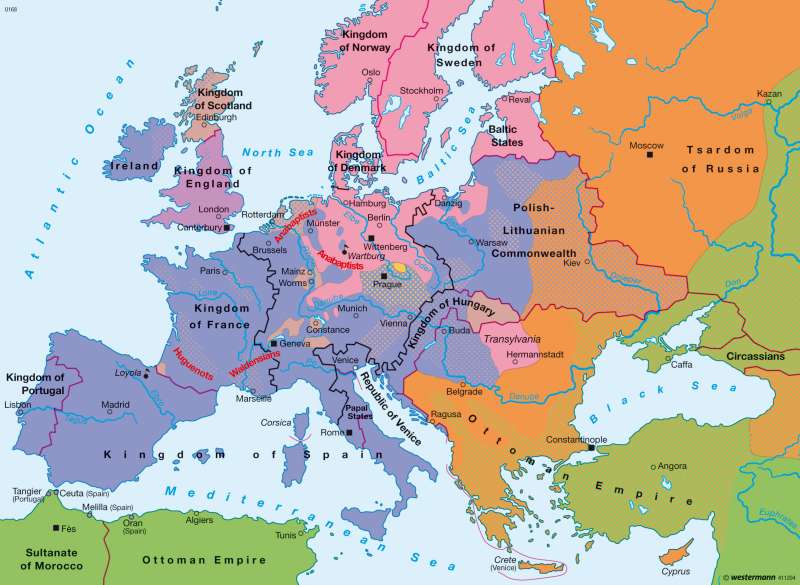The Reformation in Europe circa 1570
Europe - The modern age
978-3-14-100790-9 | Page 32 | Ill. 1

Information
Historians traditionally identify the beginning of the Modern Era with reference to two epochal events: the discovery of America in 1492 and the publication of Luther's 95 theses in 1517. Both of these events represent historical watersheds, as they led to the elimination of the physical and spiritual boundaries of medieval Western civilization. Yet they were not only the causes but also the results of profound changes. The conquest of Constantinople by the Ottomans in 1453 marked the end of the Byzantine Empire. The blockade of overland trade routes to India awakened the desire for a secure sea route to India, and Columbus embarked on his voyage to the West to find it. It is also quite probable that Luther's writings would not have had nearly the impact they had if Johannes Gutenberg had not invented a method of printing books with moveable metal characters in 1450.The spread of the Reformation
Roughly a quarter of a century after Luther's death, much of Europe was still Catholic, although the Reformation had spread rapidly during those years. The Scandinavian countries, the Baltic States and parts of the kingdom of Hungary had converted to Protestantism. Numerous Hussites in Bohemia joined reformed or the Lutheran churches. Of the German territories, Silesia, Wuerttemberg, Ansbach, Hesse, Saxony, Brandenburg, Pomerania and Prussia adopted the Lutheran faith. Followers of Zwingli and Calvin gained the upper hand in large areas of the Swiss Confederation, along the Middle Rhine, in the Republic of the United Netherlands and in Scotland, and they established Protestant communities in other countries as well (the Huguenots in France). Yet another reformist group was that of the Anabaptists, who strove for a renewal of faith through the spirit and words of Holy Scripture alone. The Anglican Church in England was an outgrowth of the break between King Henry VIII and Rome. Apart from its denial of Papal authority and the dissolution of the monasteries, the Anglican Church initially retained the liturgy of Catholicism for some time. Reforms in the spirit of Calvinism did not take place until the reign of Edward VI (1547?1553). The Waldensians, members of a reform movement founded in the 12th century, shared the basic principles of Protestantism and were persecuted as heretics.
Luther and Protestantism
When he published his 95 theses in 1517, Martin Luther had no plans to found a religious community. He firmly believed that his efforts to purify the Church of abuses and errors would be welcomed by Church officials. The Pope responded with a threat of excommunication, however, which Luther answered by burning the papal bull containing the threat.
Luther was ordered to appear before the Diet of Worms and assured safe conduct. He refused to recant, however. Emperor Charles V imposed an imperial ban on Luther and ordered his writings proscribed in 1521. Frederick III, Elector of Saxony, had Luther placed in hiding at the Wartburg Castle, where he began work on his translation of the Bible. The new doctrine provided a welcome opportunity for many German princes, for it permitted them to annex Church property and escape the influence of the Emperor and the Pope. Yet wherever the new teachings were associated with demands for social reform (Peasants' War of 1524/25), they was vehemently opposed by the evangelical princes and by Luther himself.
When Charles attempted to achieve religious unification by force at the Reichstag in Speyer in 1529, the evangelical princes responded with a Protestation, which earned them the designation as "Protestants". When the Emperor announced his intention to banish Luther's teachings entirely, they joined forces to form the Schmalkaldic League in 1531. The conflict escalated and culminated in the Schmalkaldic War in 1546. The conflict ended with the Peace of Augsburg of 1555, which guaranteed all domains within the Empire the right to choose between Lutheranism and Catholicism.
K. Lückemeier, E. Astor; Ü: Southard




